Voting begins in high-stakes German election watched closely by Europe and US
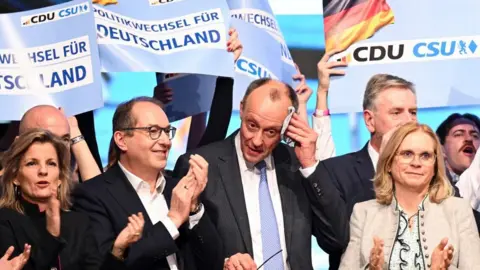 Reuters
ReutersGermans are going to the polls after an intense election campaign dominated by their country's faltering economy and a succession of deadly attacks that have made migration and security a focal issue.
Friedrich Merz, the 69-year-old conservative leader, is in pole position to become Germany's next chancellor, in a vote closely watched in Europe and the US.
He promises to fix most problems in four years - a tall order for Europe's biggest economy and a creaking infrastructure.
If Merz's Christian Democrats (CDU) win, he will need to forge an alliance with at least one other party, most likely Olaf Scholz's Social Democrats, whose government collapsed late last year.
On the eve of the vote, Merz was adamant there would be no deal with the far-right Alternative for Germany (AfD), which is poised to become the second biggest political force, ahead of Scholz's centre-left party.
Some 59.2 million Germans are eligible to vote, and while millions already have by post, polls indicate as many 20% were undecided ahead of election day.
The polls close at 18:00 (17:00 GMT) with a clear idea of a result likely to emerge during the evening.
Voters are energised by this pivotal election, and campaigning continued right through Saturday evening with a final debate on national TV - the ninth this month.
This is a watershed moment as Germany will have to make big decisions on the world stage as well as at home.
Merz promises strong leadership in Europe, but Berlin is also under pressure to loosen the budget strings for its military.
As Ukraine's second-biggest provider of military aid, Germany's next government will face a US president who has condemned President Volodymyr Zelensky as a dictator and fractured the West's united front against Russia.
German political leaders have also been shocked by US Vice-President JD Vance, who has met the AfD's candidate for chancellor, Alice Weidel, and called for an end to the long-standing taboo of talking to the far-right.
In Germany, that taboo is known as a firewall or brandmauer.
Merz was accused of breaking it last month when he used their support in parliament. There were protests against the far-right in several German cities on Saturday.
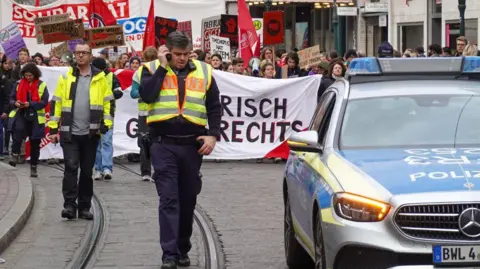 Getty Images
Getty ImagesThe AfD is already popular in several eastern states, but is rapidly growing in the west too, attracting support among younger Germans via TikTok.
One Weidel campaign video has had four million views.
Her message is simple: Vote AfD, break the firewall and change German politics.
The AfD wants to leave the EU, scrap climate change measures, build nuclear power plants, and repair gas lines and relations with Russia.
Find out more about Germany's elections:
Who's who and what you need to know
Merz: Risk-taker who flirted with far right
Katya Adler: Far right looks for breakthrough as Germany falters
But its voice has been loudest on migration and security after five deadly attacks since last May, including three during the election campaign in Magdeburg, Aschaffenburg and Munich - all allegedly carried out by immigrants.
A stabbing at Berlin's Holocaust memorial on Friday night has kept the issue in the headlines. The victim survived, and police said the attacker was Syrian and his motive antisemitic.
The AfD has embraced a highly controversial policy called "remigration", which it defines as deporting migrants who have committed crimes. But the term can also refer to the mass deportation of migrants and their descendants.
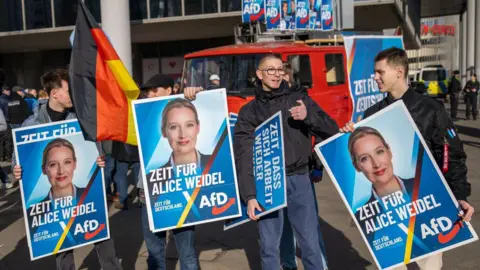 Getty Images
Getty ImagesThe anti-immigration party has already secured a foothold in parts of the west, especially in Germany's old industrial heartland in the Ruhr valley.
In last summer's European elections it won the vote in some northern areas of the city of Duisburg, with 20% in Marxloh, 25% in an adjacent area and 30% next door to that.
Marxloh is a vibrant district with a large immigrant community, known for its array of shops selling Turkish fashionwear for brides.
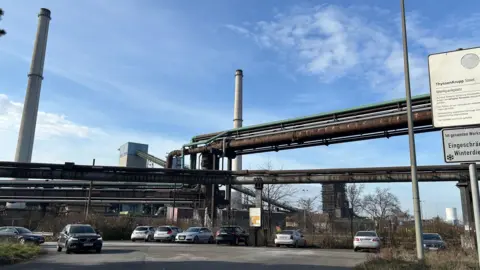
But it has also suffered extensively from the decline of the coal and steel industry and a lack of government investment.
In a park close to Marxloh's remaining steelworks, five young men in their early 20s explained why they all planned to vote AfD.
"We're young, we need work and they don't give us a chance to find training," one man complained.
"We've no money; everything's more expensive; there aren't many jobs any more and there's so much dirt here."
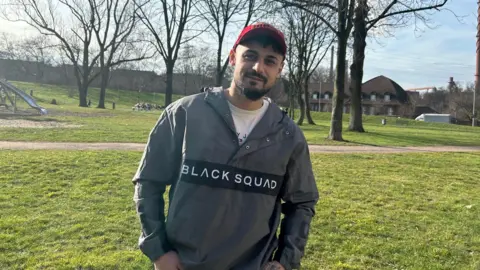
The AfD is not known for its social policies, but its message on security cuts through, and this group does not see the anti-immigration party as extreme.
"No, they're just normal people."
In the east, it is in the rural areas where the AfD does best, but in the west it is growing in cities that have lost their industrial base, says Prof Conrad Ziller of the University of Duisburg-Essen.
"Voices of people in favour of the AfD have become so loud, so if you're in a doctor's waiting room it's really common to hear people chat about getting angry about the established politicians and government."
Migration is the most common frustration, and he believes Weidel has capitalised on that by appearing so prominently in all the TV debates.
Often when the debate touched on the economy, social justice or inequality, Prof Ziller said "the AfD deflected it and said the main problem is not economics, it's migration, and the government didn't do a good job".
While the opinion polls have been consistent about who is leading the race, some of the parties might not make it over the 5% threshold for the newly slimmed-down parliament.
If fewer parties make it into the 630-seat Bundestag, it will be more straightforward to form a coalition with a majority.
The economic liberals, the Free Democratic Party (FDP), were in the outgoing government but risk oblivion on Sunday along with left-wing populist party BSW.
The Left party, however, has seen a resurgence in recent days and pollsters suggest it will become the fifth largest party after the Greens.
